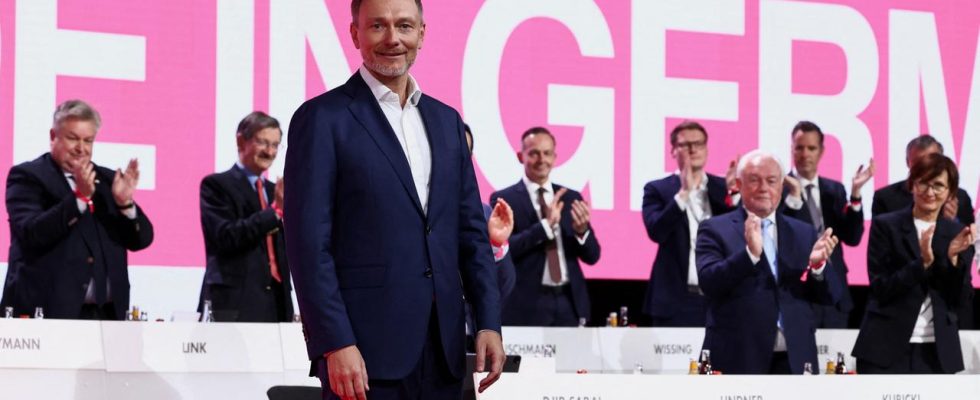analysis
There has been a lot of talk in the past few days about whether the FDP still wants to remain in the traffic light coalition. The tone of this was pretty clear at the federal party conference in Berlin.
The FDP seems inspired – by its own paper for more economic growth, which party strategists had timely and cleverly placed in public before the party conference. But the paper, which is intended to serve as a wake-up call to the three-party alliance under Olaf Scholz, also has an internal effect: Some FDP delegates proudly carry the twelve points on printed T-shirts through the party conference hall. It touched a nerve, you can feel that in many conversations on the sidelines of the FDP federal party conference.
Education Minister Bettina Stark-Watzinger is already full of self-praise in her greeting: “For years, economic policy has not been discussed as intensely and in detail as it is these days.” Economic policy is finally back in the public eye – “thanks to our wake-up call!”
The economy is weakening in Germany. The FDP has its body and stomach issue back – and that strengthens its self-confidence. Reducing bureaucracy, promoting overtime, abolishing solidarity and pensions at 63 – all for the benefit of the economy. The term “economic turnaround” from party leader and Finance Minister Christian Lindner runs like a common thread through the party conference and becomes the pivotal point of his speech. He coined the term some time ago.
“Wake-up calls to ours Competitiveness”
Of course, Lindner wouldn’t mind if the choice of words soon became as historically influential for the second half of the traffic light legislation as the Chancellor’s words about the “turning point” after the start of the Russian war of aggression on Ukraine. This economic turnaround is not an end in itself, because it serves everything: the financially weak, who would find more work, democracy, alliance and national defense.
After all, Putin’s war of aggression would result in new expenses, a task that would take decades. This doesn’t work on credit. This is intended to be an allusion to the reform of the debt brake demanded by the SPD and the Greens, but also by the CDU-governed states.
Lindner begins his speech with a swipe at Scholz: “Some say that the economy is singing lamentations. I say that we must not ignore the wake-up calls about our competitiveness, otherwise we will lose substance.” With such sayings he is sure to receive applause from the delegates.
No more rift fungus
But overall, with his speech lasting over an hour, Lindner maintains a balance between criticism and praise of his own government: between points in the traffic light bills that the FDP is critical of and mentions of things in which the traffic light is much better than the previous government.
The draft for basic child security, for example, urgently needs to be revised because it has “reached the status of absurdity”. However, Lindner neither mentions the green coalition partner nor their responsible minister, Lisa Paus, by name. Instead, he tends to dish it out against the CDU and CSU, especially when it comes to the previous climate protection law, which the traffic light coalition has now revised and improved “thank God”.
The FDP politician today clearly does not want to drive any further divisions into the coalition, nor send any further signal of traffic light fatigue – this is also aimed at the rebels within the party, but a minority in the FDP who would prefer a new membership decision to leave would start at the traffic lights. Promote work instead of unemployment, reduce taxes instead of subsidizing renewable energies – Lindner receives applause for every point.
Clear criticism of the CDU
But the FDP not only distances itself from the coalition partners SPD and Greens, but without badmouthing them. The criticism of the CDU is even clearer because it does not reliably stand by the debt brake – and because EU Commission President Ursula von der Leyen is putting an unnecessary burden on the economy. “There’s a reason why the CDU is hiding its top European candidate on the posters. Because the stress of bureaucracy has a first name: Ursula.”
The European election campaign also kicked off at the FDP party conference. The top candidate is Marie-Agnes Strack-Zimmermann, who has made a name for herself as a defense politician. She promotes a common European security policy and warns against the “right-wing radicals” of the AfD and the “left-wing radical alliance” of Sahra Wagenknecht: “Both want a mandate to take Germany out of all alliances, out of the EU, out of NATO. It wouldn’t be just an economic catastrophe, it would set us back a hundred years.”
Despite poor poll numbers, the FDP is hoping for a successful European election. It will be an important test of sentiment, also in federal politics. A result of less than five percent would be a bad omen for the Lindner party – even if there is no five percent hurdle in the European elections. This will be followed by state elections in Saxony, Thuringia and Brandenburg in the fall.
The FDP is going into the European elections with Marie-Agnes Strack-Zimmermann as the top candidate.
Household cliff after the European elections
Brandenburg’s top candidate Zyon Braun wants to bring the FDP back into the state parliament. And appeals to his party: “Kenya is governed in Brandenburg: SPD, CDU and Greens. And if you think the traffic lights are difficult, all I can tell you is to come to us!”
But there are also those voices in the FDP who openly threaten, like Florian Kuhl from Bavaria: “If our twelve points cannot be implemented, if we cannot change the course of this country towards growth and innovation, then we can only give one answer and that is: Get out of the coalition!” However, most people disagree: The FDP wants to change a lot, but in the government. She encourages herself to do this at this party conference.
At the end of the first day of the meeting, FDP General Secretary Bijan Djir-Sarai urgently asked for approval of the key motion: This is not a divorce motion for the traffic light coalition, “but a declaration of love for our country!” You are not in a vacuum, not the opposition, but the governing party – but of course you want to bring this into the coalition. The pragmatic course of making the best of this sometimes very controversial three-party alliance has clearly gained the upper hand among the Free Democrats – for now.
But the real hurdle for remaining in the coalition, the 2025 budget and the associated conflict-filled deliberations, will wait after the European elections at the latest. They all know this at the “Station Berlin” conference venue. But for now, it seems, they don’t want to let this spoil their confident mood.


